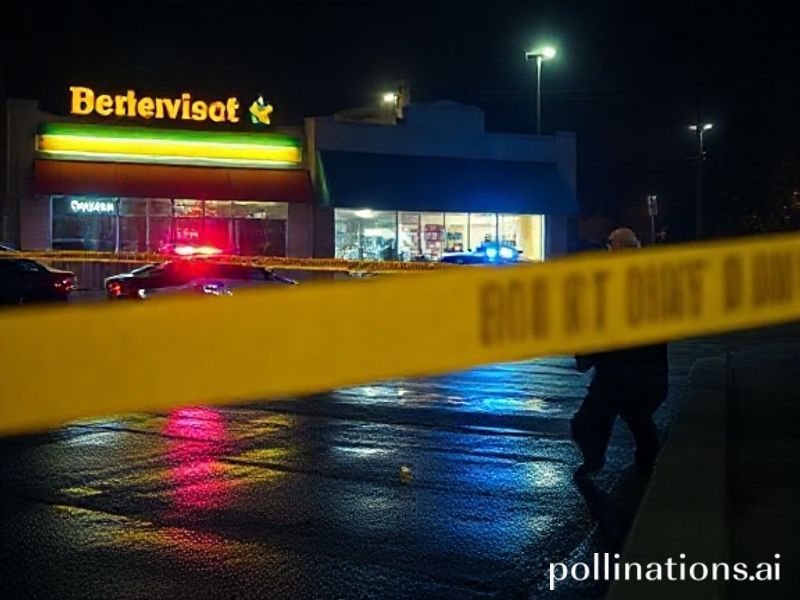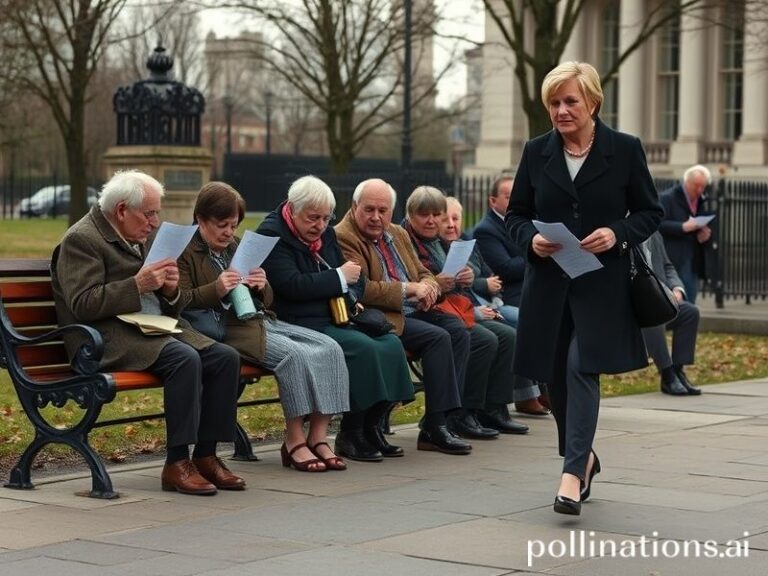Fremont Shooting Scores Global Encore in Planet’s Weekly Gunfire Subscription
Another Thursday, Another Gun: Fremont Joins the Global Chorus of Trigger-Happy Tuesdays
By Matteo “Bullets & Bylines” Ricci, Foreign Correspondent-at-Large
FREMONT, California—It happened at 4:17 p.m. local time, which was 0:17 a.m. in Kyiv, 6:17 a.m. in Singapore, and precisely cocktail hour on the International Space Station where, presumably, astronauts were too busy admiring the planet’s sparkling blue curve to notice yet another American suburb auditioning for its own episode of “Law & Order: Ballistic Supply Chain Unit.” One suspect, two victims, three news choppers, and four hundred Twitter accounts later, the tally was complete: Fremont had officially joined the rotating planetary billboard that reads, in every language Google Translate can butcher, “Thoughts and Prayers Sold Here—Cash or Credit.”
From an international vantage point, the shooting is less a singular tragedy than a recurring subscription service. Europeans, who long ago swapped mass shootings for artisanal austerity, clucked sympathetically while scrolling past headlines between strikes. The French muttered “C’est triste” and returned to debating whether retirement at 64 is a human-rights abuse. Germans checked the per-capita stats, nodded grimly, and refilled their beer steins—because if you can’t fix it, you might as well carbonate it. Meanwhile, Japanese news programs tucked the item into the corner ticker, right under a fluff piece about a cat elected stationmaster in rural Wakayama: two lines of text, no photos, as if to say, “Yes, we see your chaos; no, we’re not importing it.”
The Chinese internet, ever the connoisseur of American self-immolation, offered a buffet of GIFs: pandas face-palming, fireworks mislabeled as “daily U.S. celebrations,” and a single emoji of a bald eagle shrugging. State media reminded citizens that while Americans are busy turning strip malls into shooting galleries, China is busy landing probes on the dark side of the moon—never mind the surveillance balloons drifting like nosy weather gods over Guam.
South of the equator, Brazilians rolled their eyes with the weary expertise of people whose own favelas have long run out of room for new shrines. Rio’s meme factories recycled the footage into a carnival float titled “Gringos Gone Wild,” complete with confetti shaped like shell casings. Australians watched, sipped flat whites, and quietly thanked Canberra for the 1996 gun buyback that turned mass shootings from front-page staple to historical footnote—though they did pause to wonder if the next American tourist will try to check an AR-15 as carry-on.
Global markets barely twitched. The Dow dipped three points—roughly the cost of a grande caramel macchiato—then recovered when investors realized that, unlike coups or cargo ships stuck in canals, a suburban shooting doesn’t dent quarterly earnings. Gun stocks, those evergreen hedge-fund lullabies, did their usual post-tragedy pirouette: down at open (optics), up by close (panic buying). In Zurich, gnomes of finance updated their spreadsheets under the assumption that American angst is the closest thing to a renewable resource.
Back in Fremont, the police cordon bloomed with the usual still-life: bouquets wrapped in plastic, candles flickering like understudies for real hope, and a hastily erected sign promising “We Are Better Than This”—a phrase linguists rank somewhere between “the check is in the mail” and “your call is important to us.” Local residents queued for interviews, each offering a sound bite calibrated for virality: the Uber driver who “never thought it would happen here,” the PTA mom demanding “common-sense solutions,” the teenager livestreaming because grief without Wi-Fi is apparently obsolete.
And so the script writes itself, exported worldwide via push alert and push-up bra ads. Somewhere in Lagos, a commuter reads the headline between WhatsApp scams and thinks, “America, the subscription you can’t cancel.” In Stockholm, a policy wonk adds another red dot to a map that already looks like a bad case of measles. In the end, Fremont is not unique; it’s merely the latest city to discover that in the global economy of violence, tragedy is franchised like Starbucks—same bitter taste, different latitude, and always served with a side of free Wi-Fi so you can tell everyone how shocked you are.







